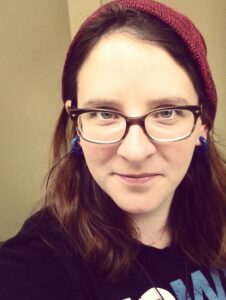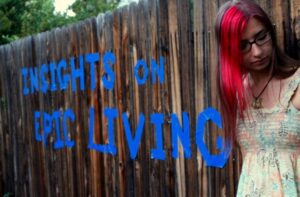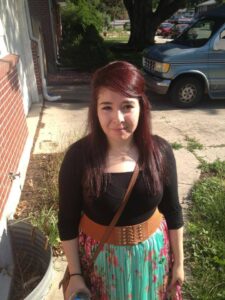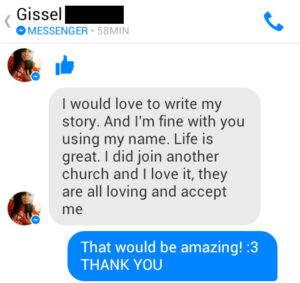Editorial Note: The following is reprinted with permission from Eleanor Skelton’s blog. It was originally published on February 15, 2015.
Homeschool alumni Alecia Faith Pennington’s Help Me Prove It campaign went viral on social media this last week.
She explained that she can’t vote, can’t get a job and can’t get a driver’s license, all because she can’t prove that she was born in the United States.
Because she was born at home and her parents allegedly never filed for a birth certificate, she said she cannot prove her US citizenship. Her parents also never filed for a Social Security number and never took her to a hospital, and she has no school records because she was homeschooled, according to her now-viral YouTube video.
“This leaves me with nothing to prove my identity or citizenship,” Alecia said in the video. “I am now 19 years old and I’m unable to get a driver’s license, get a job, go to college, get on a plane, get a bank account, or vote.”
Her YouTube video was viewed over 500,000 times and reached Reddit’s front page within a week, according to Homeschoolers Anonymous.
But as the survey conducted by Homeschool Alumni Reaching Out (HARO) a few days ago demonstrates, she is not alone.
And the majority of survey respondents whose parents denied them their identifying documentation were also members of the Homeschool Legal Defense Association (HSLDA), which is an interesting correlation.
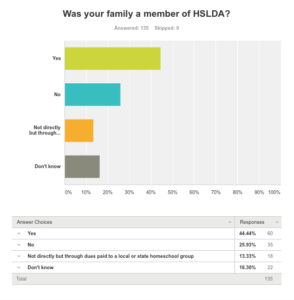
My parents were members of HSLDA.
They kept a card with HSLDA’s hotline number taped beside our front door when we first started homeschooling in the early 90s. (I’m the oldest child in my family.)
My parents told me if anyone from Child Protective Services showed up at the door, we needed to call that number right away and not answer any questions until we talked to their legal representatives. They taught me that our ungodly government was looking for reasons to persecute good Christian families who just wanted to raise their children according to Biblical teachings.
They said spanking wasn’t abuse, even if it left marks, because it was all part of the plan to raise children to fear God and obey authority. If anyone asked if my parents spanked, we were to lie and say they didn’t.
When my parents gave me an ultimatum between moving out and transferring colleges to Bob Jones University summer 2012, I left with only my driver’s license.
Earlier that year, my mom gave me a folder marked “Eleanor.” She kept one for me and each of my siblings that she planned to give to us when we turned 18.
This folder had everything from baby footprints and my birth certificate to my social security card and passport to x-rays and health records for my growth hormone treatment as a teenager.
But the one of the most destructive wildfires in Colorado’s history, the Waldo Canyon Fire, started one sleepy Saturday in June 2012. By the next Tuesday, the winds rolled it down the mountain into the city, destroying around 300 homes, and my family and neighbors were planning to evacuate.
My dad took the folder with all my identifying documents for safekeeping in a safe deposit box. I reminded him I would need it later.
I moved out on August 1, 2012. Before and after moving out, I asked for that folder and my documentation over and over.
I applied for jobs off-campus for additional income, but could only provide my drivers’ license for the I-9 documentation for employment to prove my US citizenship and ability to work legally, which wasn’t enough since the document requires two forms of identification.
My mom finally gave me a few copies of my social security card and passport. But not before I’d already been denied one tutoring job after an interview because I couldn’t produce proper identification.
They kept telling me they were holding my documentation in safekeeping for when I changed my mind and decided to go to Bob Jones University instead of “rebelling” and moving out on my own,
About six months after I left home, they finally gave me my social security card.
I continued asking them for my passport.
Text messages from 11/17/2013:
Me: May I please pretty please have my passport?
Mom: Passport applications are available at the post office. […] I will continue to pray for you. Goodbye.
Later, my dad said I had to repay large amounts of money that he claimed I owed him before he would give me my passport. As a college student with part-time employment, I didn’t have extra money to replace my passport or my other identifying documents.
I didn’t get my passport back until October 2014.
So this week, the Help Me Prove It campaign reminded me that I still don’t have my birth certificate or health records.
I emailed my parents again two days ago.
My dad replied the same day:
Have not seen your BC (birth certificate) for quite some time. Your best bet there is to contact Jefferson County in Texas. They can likely give you a copy. Very busy these days. Best regards, TS
Mom answered the next day:
Dad and I had to request birth certificates when we first applied for passports. It was not something that [your grandparents] had. We wrote Harris County and Duchess County for our birth certificates. You won’t need one to renew your driver’s license. Just proof of address and take the eye test. Mom.
No answer about my health records.
At least I’m registered in the county system, so I can get another birth certificate if I need to get a driver’s license in another state, and I can request copies of my health records from my doctors.
Alecia Pennington can’t.
So yes, some of us (story 1) (story 2) who moved out years ago are still fighting to get our documentation.
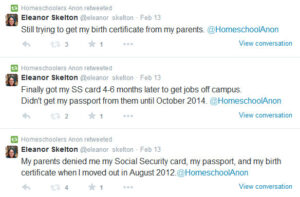
********
Shop at our Amazon store! As an Amazon Influencer, this website earns from qualifying purchases.
